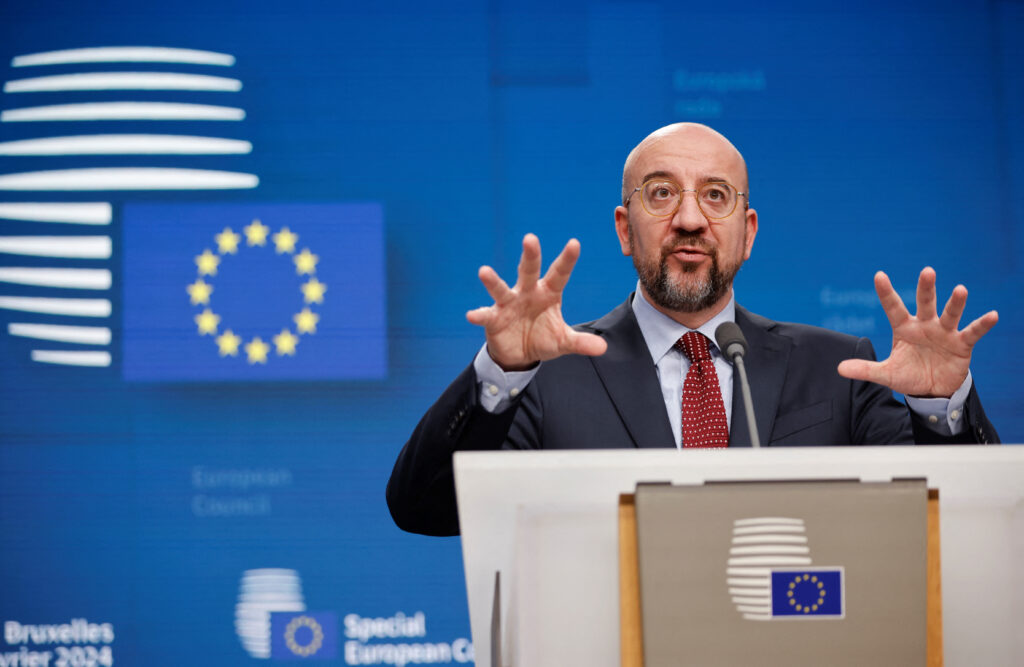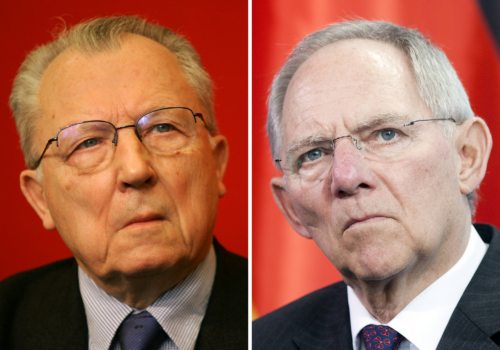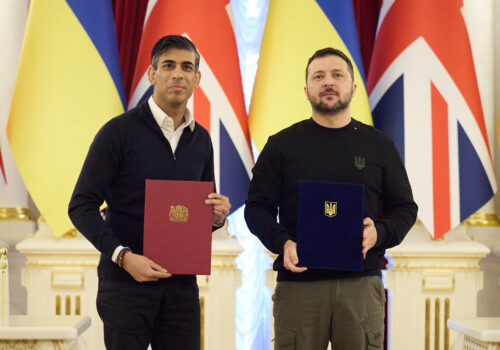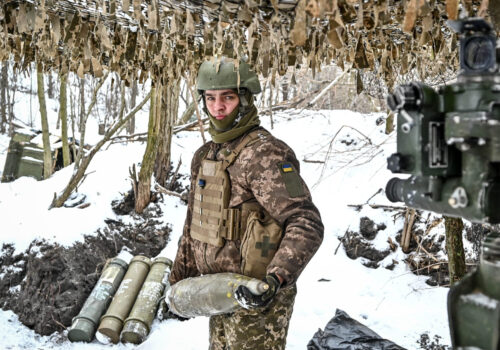“We have a deal,” European Council President Charles Michel announced on Thursday. Then, to underscore the inclusivity of that first-person plural pronoun, he added that all twenty-seven European Union (EU) countries had agreed on a fifty-billion-euro aid package to Ukraine through 2027. The breakthrough follows weeks of resistance from Hungarian Prime Minister Viktor Orbán. It also comes as the two-year mark of Russia’s full-scale invasion of Ukraine draws near and as prospects look increasingly bleak in the US Congress for additional aid to Kyiv. To better understand what the decision in Brussels means there and beyond, we asked Atlantic Council experts to share their insights below.
Click to jump to an expert analysis:
Jörn Fleck: The agreement cements the EU as Ukraine’s leading supporter
Daniel Fried: The EU acted just in time. Now, the US should follow its example.
Shelby Magid: The EU agreement flies in the face of narratives about ‘Ukraine fatigue’
Rachel Rizzo: An example of how appropriate pressure by major EU countries can seal the deal
James Batchik: A strong signal that Europe can act in its own interests
The agreement cements the EU as Ukraine’s leading supporter
The European Council’s approval of the the fifty-billion-euro Ukraine Facility comes not a day too soon—and, really, many months too late—in keeping Ukraine in the fight against Russia’s war of aggression. The now-approved package does two things: In the short term, the money will stabilize Ukraine’s government services and its war-torn economy to keep the lights on. In the longer-term, the Facility offers predictability for Kyiv and helps Ukraine on the needed domestic reforms the country will have to make to advance on eventual EU membership.
The Europeans’ delays thanks to the machinations of Orbán notwithstanding, today’s agreement in Brussels cements the EU as Ukraine’s leading supporter. That matters. It’s another reminder that Europe remains unified in support of Ukraine and further dismisses the strength of “Ukraine fatigue” arguments that float up from corners of capitals as an excuse to stop supporting Ukraine.
This agreement is also an important signal to Washington that Europe is stepping up and is with Ukraine for the long run. Coincidentally, debates over aid packages to Ukraine on both sides of the Atlantic unfolded at the same time last year in December and now. Europe missed an opportunity to better impact the US debate then. The EU hit the mark this time, showing Washington that Europe is doing its part. The EU’s processes may be messy and inefficient, but diplomacy works. Leaders overcame Orbán’s veto with a combination of peer pressure, creative threats, and imaginative concessions. No one besides those in the room will know exactly what leaders said to each other during their private meetings before and during the Council, but the agreement is the important result.
The job isn’t done. European leaders cannot let their relief for outmaneuvering Orbán distract from the real work that is needed. Fresh off a victory from Brussels, European leaders need to double down on their strategic communication. They need to communicate with renewed effectiveness and seriousness to their own people that Ukraine’s defense is their defense. This becomes all the more critical as we head into election season in Washington in November but also in June with the European Parliament elections. Europe’s leaders also need to turn to defense. Europe’s defense capabilities are hurting. Production is limited, and disagreement from leaders on defense initiatives keeps Europe’s security potential fragmented. More is needed, and fast.
—Jörn Fleck is the senior director at the Atlantic Council’s Europe Center.
The EU acted just in time. Now, the US should follow its example.
Through a combination of pressure and some sort of deal, EU leaders managed to get past Orbán’s veto and agree on an additional fifty billion euros in aid for Ukraine. That success comes just in time for Ukraine, which is fighting for its life against Russia’s war of conquest.
The deal shows that the EU, its complicated structure and tortured processes notwithstanding, can get tough stuff done. That’s more than the United States can say, where election year partisanship is still holding up assistance for Ukraine. Europe is now spending more than the United States on support for Ukraine, showing that it is hardly the free-loader that former President Donald Trump and his neo-isolationist allies claim.
Support for Ukraine is a cost-effective way of defeating an aggressive dictator, Russian President Vladimir Putin. Without risking any of their soldiers, the United States, United Kingdom, European countries, and other democracies have already damaged the Russian army and frustrated Russia’s aim of conquering Ukraine. With continued US and European support, Ukraine could do even better. But without US weapons and ammunition, Ukraine could lose, a failure that would damage European security, open the door to additional Russian aggression, and embolden other aggressors, including in Tehran and Beijing.
It’s now on Congress to get past partisanship that is damaging US interests and vote for the funds for Ukraine.
—Daniel Fried is the Weiser Family distinguished fellow at the Atlantic Council and a former US assistant secretary of state for Europe.
The EU agreement flies in the face of narratives about ‘Ukraine fatigue’
In response to today’s approval of the EU’s Ukraine Facility, Ukrainian President Volodymyr Zelenskyy may have said it best: “It sends a strong signal that Ukraine will withstand any challenges, as will Europe.”
At this critical time when Russia’s war against Ukraine seems strengthened by other global aggressors, North Korea and Iran, and the stalled supplemental including support for Ukraine drags on in a political saga in Washington, this unified agreement from the EU serves as both an important financial action and a symbolic show of political support.
As questions of “Ukraine fatigue” come up in key capitals, Europe is now sending an important message to Kyiv, Moscow, and the world that support for Ukraine carries on. Flying in the face of narratives that may suggest otherwise, this decision is critical for Ukraine’s defense efforts, but also provides imperative messaging in the battle of the wills. The Kremlin has long hoped and planned to outlast Western resolve and support for Ukraine, and Europe’s decision today serves as a stark reminder that Putin’s hopes don’t reflect reality.
Today’s EU package provides Ukraine with money it needs to continue, but to defend itself and protect its people it also needs materiel, which the agreement does not provide. And beyond the financial and military needs, solidarity and diplomatic support are also significant in the war effort. Russia may be getting a burst of confidence as it looks at the supplemental saga taking place in the United States, but this huge announcement from the EU will serve as a stark reminder to Putin that securing Ukraine’s victory remains a priority for the international community.
Timing also contributes to the power of the agreement’s message, as we approach the two-year anniversary of Russia’s full-scale invasion of Ukraine. While Russia and some of Ukraine’s doubters would like to paint the war as a lost cause and push toward negotiations that could dangerously favor the Kremlin, the reality is that the war remains dynamic, Ukraine is supported, and Ukrainians will persist as they fight for themselves and European security.
Europe sees Russia’s aggression in Ukraine as a threat to its own security and continues to treat this as a priority. Now, it is well past time for the United States to follow suit and commit to defending US national security by supporting Ukraine and pushing back against Russia.
—Shelby Magid is the deputy director of the Atlantic Council’s Eurasia Center.
An example of how appropriate pressure by major EU countries can seal the deal
At the much-anticipated EU Summit in Brussels, European nations came together to agree upon a fifty-billion-euro aid package to help Ukraine in its continued fight against Russia’s invasion. Europe deserves credit for this agreement, especially in the face of Orbán’s continuous threats to veto the aid. Once the European Parliament endorses the deal, Ukraine could get the funds as soon as March. This achievement is laudable: it highlights the EU’s ability to get things done, and it also holds a mirror up to the US Congress, which is at a total impasse in terms of approving its own continued funding for Ukraine.
However, the EU’s achievement also highlights something deeper: that when applied correctly, pressure from powerful states within the bloc can work. The central role of leaders like German Chancellor Olaf Scholz and Italian Prime Minister Giorgia Meloni in getting the deal across the finish line is an important example of using pressure in the right way for the right cause. Supporters of Ukraine in the US Congress should look to the EU in this moment and think to themselves: “If they can get it done, so can we.”
—Rachel Rizzo is a nonresident senior fellow at the Atlantic Council’s Europe Center.
A ‘definitive success’—but the EU must protect this momentum in its assistance for Ukraine
The European Council’s decision to approve fifty billion euros for Ukraine via grants (seventeen billion euros) and loans (thirty-three billion euros) is a definitive success for the European Union, showcasing its ability to tackle the most pressing issues when needed. But if the EU wishes to reshape its image as a geopolitical actor, it should limit the victory lap on this specific assistance package and instead channel this fifty-billion-euro package into a broader narrative showcasing all the various tools the EU is using to address Russia’s invasion of Ukraine. It’s all about momentum and narrative.
Lost in the euphoria of this aid package, the Council also renewed on January 29 its sanctions package against Russian entities for another six-month term. Additionally, EU member states, during this week’s informal defense ministers council, pledged to supply twenty-one billion euros of military assistance to Ukraine in 2024 (on top of the twenty-eight billion euros donated in this area), while proposing to expand the Ukraine Assistance Fund within the European Peace Facility. And while overpromising on their timeline to provide artillery shells for Ukraine, the EU forecasts reaching half of their pledge by March this year, admitting this exercise is a forcing mechanism to adapt their defense industrial base to meet Europe’s security challenges for the decades to come.
EU leaders from all its institutions should stay on message that they are using all the tools at their disposal to assist Ukraine and counter Russian aggression, and that it is done via consensus. This message is needed to thwart counternarratives that Europe is not doing its part, showing skeptics that the EU is up to the task and that it can lead by example. Finally, the EU needs to protect this momentum by aggressively countering false narratives and disinformation coming from both the Kremlin and pro-Russian media outlets in EU member states. Protecting EU cohesion will enable the institution to build upon today’s success for a definitive long-term campaign.
—Andrew Bernard is a visiting fellow in the Council’s Europe Center.
The EU’s aid is crucial, but US assistance to Ukraine will be essential to stopping Russia
This has been a banner week for the EU and its member states’ support for Ukraine. On Thursday, the European Council agreed on a fifty-billion-euro aid package for Ukraine over the next four years, seventeen billion euros of which will be given as grants. The financial assistance is crucial to keeping Ukrainian government services running; Kyiv will welcome the four-year framework, which will allow policymakers to make multi-year plans as the country fights off Russian aggression.
The final section of the European Council’s aid announcement stated the bloc’s resolve to also supply military aid to Ukraine in a “timely, predictable, and sustainable” manner. The statement did acknowledge current shortcomings in providing ammunition and missiles—EU countries will not be able to provide Ukraine with the one million artillery shells it promised by March—and called on member states to find new ways to ramp up production. While far from ideal, this renewed sense of urgency to get Ukraine the weapons it needs and its relatively nimble policymaking should inspire some confidence in the EU to make good on its promises.
The transparency and cohesion in Brussels (with the significant exception of Hungary) stands in stark contrast to the months-long gridlock in Washington over military aid to Ukraine. While the White House and the Senate have made good faith efforts to draft and pass a bill, a small but powerful group in the US House of Representatives appears to be holding any deal hostage to extreme partisan interests. Even with major aid from the EU, US support for Ukraine will be essential to stopping Russia and securing shared transatlantic interests.
—Andrew D’Anieri is a resident fellow at the Atlantic Council’s Eurasia Center.
A strong signal that Europe can act in its own interests
This agreement is good news for Ukraine and for Europe. For Ukraine, the fifty-billion-euro package, comprising seventeen billion in grants and thirty-three billion in loans over the next four years, provides Kyiv with assurances that the state can function while Ukrainians continue to fight for survival. The deal isn’t a blank check for Kyiv. Ukraine will need to design a plan with oversight from the EU that uses the money for smart investments and structural reforms to stimulate Ukraine’s economy. That will help Ukraine to align with other EU reforms during negotiations for membership. Ukraine still desperately needs more predictable military aid from its partners, but the budget support will be crucial in keeping the Ukrainian state running.
For Europe, this is also good news. It’s a strong signal that the EU can act in its own interest—even if the process is slow, frustrating, and burdensome. Agreement among twenty-seven countries on anything is a feat, but that the package’s approval was waiting on one man, Orbán, shows just how united the EU remains in the recognition that Ukraine’s security is Europe’s security. Concessions to an increasingly isolated Orbán—including an annual report by the Commission on the package’s implementation, future leaders’ debates, and an option to propose a review of the budget—took off the table the potential for a yearly Hungarian veto of the package. The deal allows for some potential future grandstanding from Budapest but decreases the likelihood of any real revision to the package in the future.
Coupled with previous support and military aid provided from EU member states to Ukraine, Europe is pulling its weight while US aid is delayed in Congress. That said, European leaders are increasingly vocal about their concern over the elections in November and any implications for continued US support to Ukraine. There has been a growing rhetoric on the need for greater European military support for Ukraine. The Council, however, did not make much progress. Not agreed to at this meeting was any type of reform of the European Peace Facility, the instrument for providing EU member states with EU funds to reimburse them for military equipment sent to Kyiv. In the face of diminished or an outright pause in US military support to Ukraine, Europe will need to step up. The EU will need to play a greater role in that effort, both regardless of what happens in Washington and because of it.
—James Batchik is an associate director with the Europe Center.
Now, Ukraine can continue to operate as a state, even amid Russia’s continued attacks
Two weeks ago, President of the European Commission Ursula von der Leyen vowed funding to Ukraine with or without Budapest’s blessing. Last week, as Orbán continued to send mixed signals regarding his decision on the package, European Union leaders and diplomats increased the pressure through threatening to invoke the “nuclear option” of blocking Budapest from the EU voting process and through exploring the option of blocking EU funding to Budapest, according to a plan seen by Financial Times.
However, neither plan came to pass. The fact that Orbán agreed to the historic fifty-billion-euro package to Ukraine in the final hour—without the anticipated demand for a veto over subsequent aid—represents a welcome shift away from Budapest’s long-standing opposition to additional funding. It’s a breath of fresh air for a complicated 2024 for Ukraine.
The fifty-billion-euro package will lock in financing for Kyiv for the next four years and pay for salaries, pensions, and basic government services—all key to upholding the daily functioning of Ukraine as the country remains under constant attack from Russian missiles, cyberattacks, and large-scale military operations.
Though the package is immensely needed and welcome, continued aid for Ukraine is not out of the woods yet. Additional budget support and military aid from the United States remains in limbo, and upcoming elections in the European Parliament in June and the United States in November could pose a shift in continued transatlantic cooperation between Ukraine and its Western partners. More continuous, predictable, and stable aid is needed today, tomorrow, and until Ukraine wins.
—Aleksander Cwalina is a program assistant for the Atlantic Council’s Eurasia Center.
Further reading
Wed, Jan 3, 2024
Delors and Schäuble leave melancholic legacies for Europe. Now no one is left in charge.
New Atlanticist By
Former French Finance Minister Jacques Delors and former German Finance Minister Wolfgang Schäuble both passed away in December 2023, leaving behind an indelible imprint on the continent.
Thu, Jan 18, 2024
Europe steps up support for Ukraine in fight against Putin’s Russia
UkraineAlert By Diane Francis
There is now a growing realization across the continent that Putin is a European problem, and it is primarily up to Europe to stop him, writes Diane Francis.
Tue, Jan 23, 2024
No European security without Ukrainian victory
UkraineAlert By
As the Russian invasion of Ukraine approaches the two-year mark, Western leaders increasingly acknowledge that there can be no European security without Ukrainian victory, writes Pavlo Zhovnirenko.
Image: European Council President Charles Michel takes part in a press conference on the day of a European Union summit in Brussels, Belgium February 1, 2024. REUTERS/Johanna Geron



